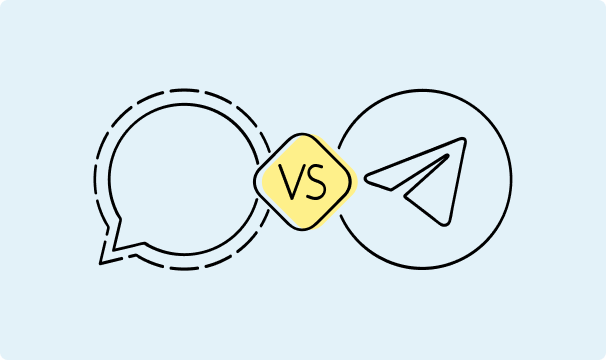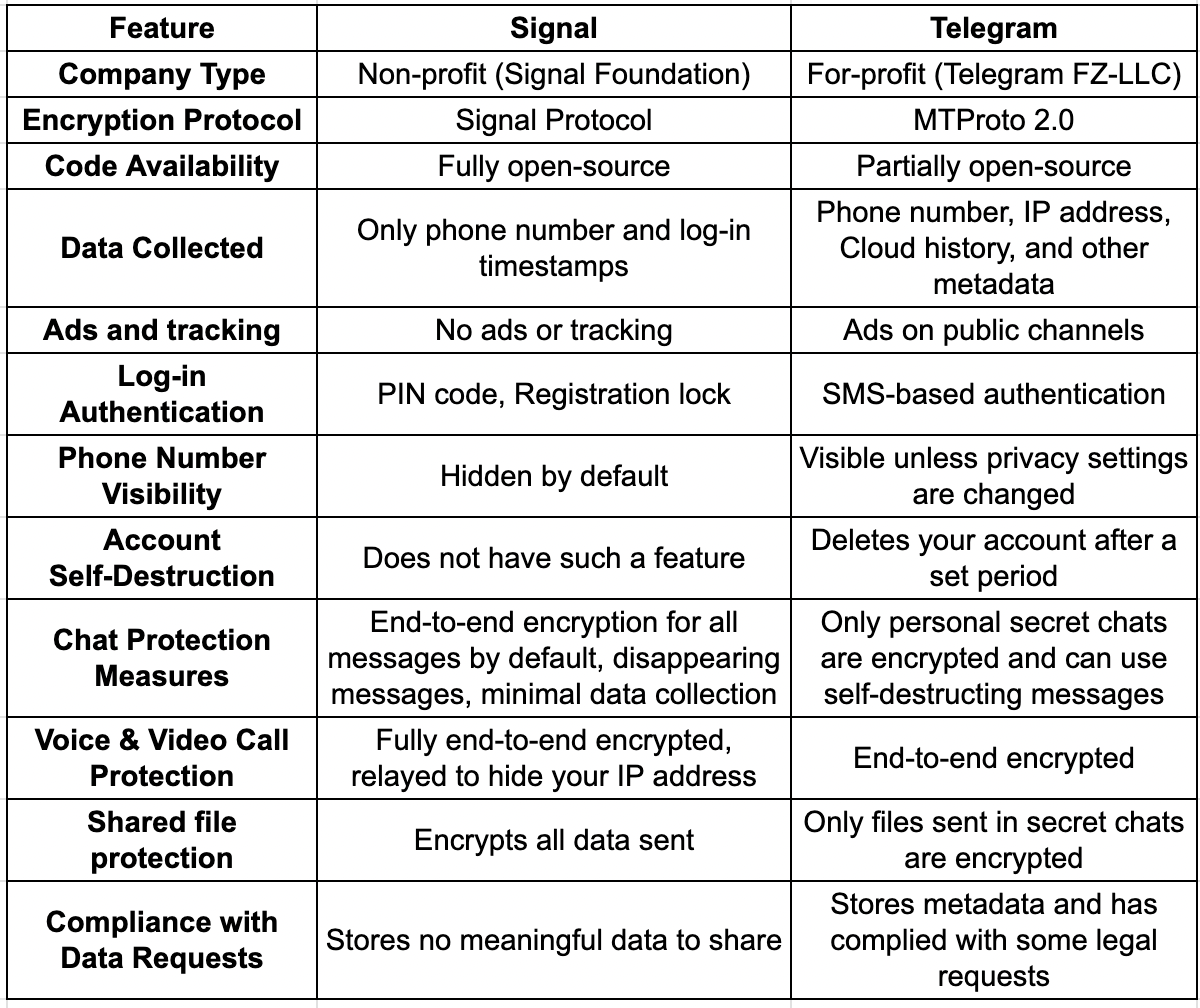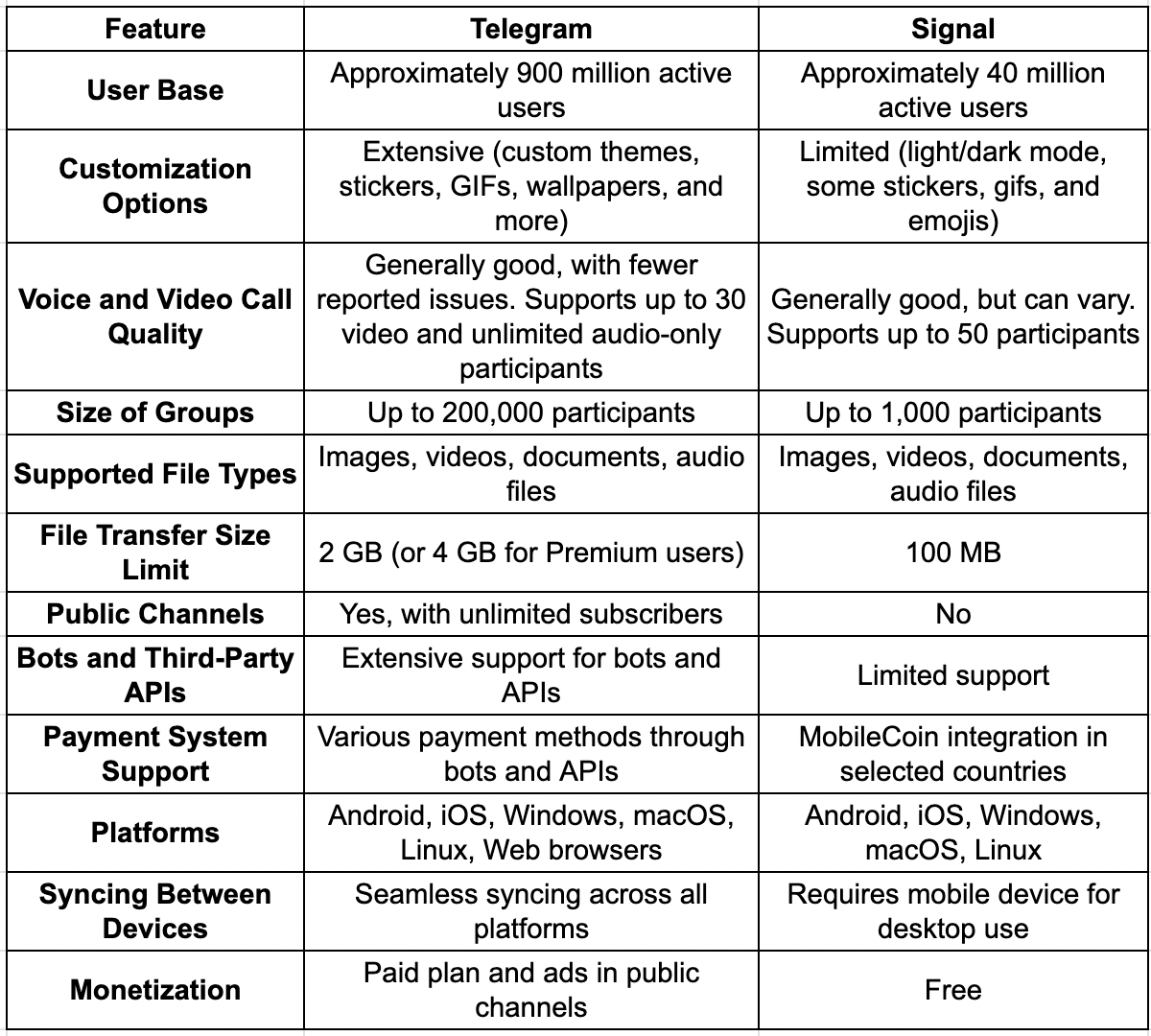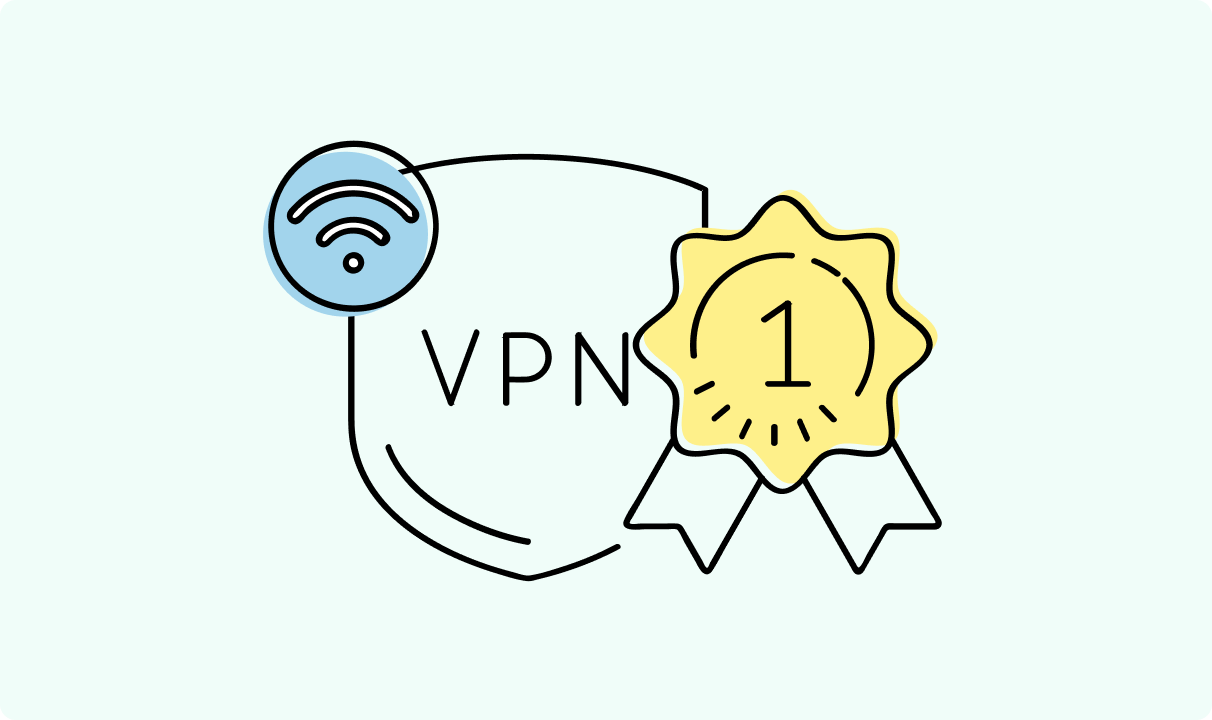Signal Vs Telegram: A Comprehensive Comparison
Everybody has to make a choice on how much convenience they're willing to sacrifice for digital privacy. Signal and Telegram are two popular messaging platforms appealing to different users on this spectrum. Privacy advocates almost unequivocally promote Signal, while Telegram has many more common users.
Whether to prefer the features or no-compromise encryption is entirely up to you, but making a choice is impossible without a thorough comparison. Chances are, that after considering all the features of these messaging apps, you'll find a use for both just on different occasions.

Rasa Sosnovskytė
9 min read

What is Signal?
Signal is a non-profit encrypted messaging app that uses open-source technology to protect free expression and enable secure communication. The Signal Foundation is entirely funded by donations from its users. It has no advertisers, investors, or other stakeholders who would want to profit from your messaging data.
Predecessor apps, TextSecure and RedPhone, provided encrypted text messaging and voice calling, respectively. They both were acquired, but their source code remained open, allowing their developers, Moxie Marlinspike and Brian Acton, to create the encrypted messaging app Signal in 2014.
End-to-end encryption is at the heart of Signal, and its protocol is widely regarded as the best one available. Signal is aimed at privacy-focused users who want all their communication - text messages, voice, and video calls, to be fully encrypted.
Signal is available for iOS, Android, MacOS, Windows, and Linux, with all the open-source code available on GitHub. Anyone can check that there are no backdoors, every conversation is encrypted, and only the bare minimum of data is stored.
What is Telegram?
Telegram Messenger is a feature-rich, cloud-based instant messaging platform with almost a billion active users. It was developed in 2013 by Nikolai and Pavel Durov after the Russian government took over their previous project, the social media platform VK.
Much of Telegram's appeal and popularity comes from its social media-like group chats, bots, and channels. They played a crucial role when organizing protests in Belarus, Russia, and Hong Kong. As such, Telegram has gained a reputation for denying government requests for user data.
The company is based in Dubai using several other countries for data centers to protect the data not covered by end-to-end encryption. Optional encryption of text, voice, and video calls allowed the developers to provide more features, including ads and premium reactions for monetization.
Telegram is available on all major platforms with some of the code being open-source. The back-end code is not available for inspection, which led some privacy investigators to raise doubts about user data safety. Such concerns were further fueled by the recent arrest of one of Telegram's founders in France.
Which Messaging App Offers Better Privacy?
Signal
Singal is widely regarded as the most secure online messaging platform. Much of it is due to the end-to-end encryption based on their own Signal protocol (previously called TextSecure protocol). All communications are encrypted by default at all times, only for the sender and the recipient to access.
The encryption protocol allows group chats to be protected as well, although this creates technical constraints limiting the size and customization options. For privacy purposes, it's much more important that Signal collects as little metadata as possible. Implementing quality-of-life functions might need more user data, which is why they’re sometimes avoided altogether.
The only information stored on Signals servers unencrypted are public keys, push tokens, approximate log-in timestamps, and users' phone numbers. The latter is a requirement for unique user identification and is one of the only critiques of the app's privacy measures, although somewhat mitigated with usernames.
All other data is end-to-end encrypted so that not even the Signal team can access it. Media and messages will be stored on your device, so Signal provides measures to protect it. There's SMS verification, and you can enable a PIN code with a registration lock to deny unauthorized log-ins.
Even if your device is lost and these safeguards are overcome, chats and calls can be further protected. Disappearing messages delete themselves after a set time, so there's no chat history, including any files you have sent. Additionally, voice and video calls are relayed through Signals servers so that your original IP remains unknown.
The effectiveness of these measures is ensured by the fact that Signal Foundation is a non-profit and periodically submits to various audits and transparency reports. There are no records of Signal handing over meaningful user data to governments.
Telegram
Compared to Signal, most of Telegram's privacy features are optional. By default, Telegram's chats are encrypted only between your device and the server, but there's no end-to-end encryption. Telegram itself can potentially access your data and pass it on to third parties.
This is a major privacy vulnerability, especially considering that much of Telegram's convenience rests on them storing your data. Messages, contacts, shared files, and various metadata, such as IP addresses and device type, are indefinitely stored in the cloud unless you delete them yourself.
With a bit of tinkering in settings, Telegrams' privacy can be greatly increased. You can hide your phone number and online visibility, enable two-step verification, passcode lock, and even set the account to self-destruct after a set period of inactivity (three months, for example).
Each chat can be further protected with secret chats which ensures end-to-end encryption for the conversation along with the possibility to send self-destruct messages, including those that contain files. Voice and video calls are encrypted in the same way using the MTProto 2.0 protocol.
Secret chat encryption is generally considered strong, but only some client-side aspects are open-source. Unlike Signal, Telegram's back end is proprietary and closed to inspection or independent audits. To make matters worse, Telegram admitted to handing over user IP addresses and other data to governments.
Verdict
While it wouldn't be fair to say that Telegram isn't private for ordinary use, Signal is clearly a much more secure and privacy-focused app. It offers better privacy features, stores less user data, almost everything is end-to-end encrypted, and there are no controversies surrounding Signal developers.

Signal vs Telegram Features: Which App Stands Out?
Telegram Features
What Telegram lacks in privacy compensates in features. It's one of the most feature-rich messaging platforms with extensive customization options. You can change themes, stickers, emojis, and chat backgrounds as well as easily sync your data in the cloud.
Users chat, send videos, and other data of up to 1.5 GB individually or with groups of up to 200,000 members. The channel feature takes it even further by allowing one-way communication with an unlimited number of members.
All kinds of content can be shared on Telegram with the exception of illegal material. Some of the more unique content types include polls, quizzes, live broadcasts, scheduled posts, pinned messages, shareable links, stories, and more.
Channels can be set to private or public and monetized through ads or subscriptions. There are even analytics tools for channel owners that provide engagement statistics.
Telegram bots are a unique feature automating various tasks, such as sending reminders, answering questions, collecting data, or generating reports. Bots can be created with third-party APIs or use complex conversational flows to assist users in tasks like making payments or playing games.
All these and many other Telegram features function on top of what you would expect from a regular messaging platform. They can be improved even further with paid Telegram premium subscription, which, besides increasing the size of uploads, is mostly oriented towards content creators on the platform.
Signal Features
Signal is, first and foremost, a private and secure messaging app. As such, the user interface is more simplistic, and the features it packs are modest compared to Telegram. Yet, Signal delivers all that's essential for online communication in private messages and even larger groups.
The app allows users to send voice or text messages and various file types, such as images, videos, and PDFs, with a limit of 100 MB. You can also share your screen and location data as well as use a decent selection of emojis, gifs, reactions, and stickers.
Group chats are limited to 1,000 participants, and group video or voice calls are limited to 50 participants. With Signal, you won't experience social media-like channels reporting news or discussing various topics like in Telegram.
Even the biggest group chats in Signal require an invite to join, as it would defeat the purpose of end-to-end encryption otherwise. There are some signs that Signal developers are looking for ways to bring similar features while not compromising privacy.
For example, Signal is testing a payment system based on the cryptocurrency MobileCoin. It's only available in a few selected regions, but it's clear that privacy is the priority. The same can be said about voice and video calls, which, based on user reviews, somewhat lack consistent quality.
Add the lack of convenient syncing between devices or other messaging apps, and convincing your friends to use Signal becomes a difficult task. Perhaps that's why Signal has a significantly smaller user base (around 40 million) compared to Telegram or other less private apps.
Who Wins
Telegram is the clear winner in terms of features and content available on the platform. Using it with stricter privacy settings and enabling secret chats somewhat narrows the feature gap between Signal and Telegram. Yet, switching to Signal is still challenging if privacy isn't your utmost priority.

Pros and Cons of Each App
Signal Pros
- Signal protocol: All communication uses a leading end-to-end encryption by default.
- Open source: Signal's client and server code is easily accessible for anyone to inspect.
- No ads or tracking: There are no attempts at monetizing user data or implementing paid features.
- Minimal data collection: With the exception of phone numbers, no identifying metadata is stored.
- Secured group chats: Even large communication channels use full message encryption.
Signal Cons
- Voice and video call quality: While decent for most use cases, some users report low communication quality.
- Size of group chats: Signal's groups are limited to 1,000 participants, which is significantly less than what Telegram offers.
- Lack of users: Most other popular messaging platforms have attracted many more users to chat with.
- Complicated data syncing: Partly due to lack of cloud storage, accessing your data or importing it from other apps is inconvenient.
- Customization features: Compared to Telegram, Signal lacks various reactions and chat functionalities.
Telegram Pros
- Large user base: Telegram is one of the most popular messaging apps in the world.
- Secret chats: There is an option to use encryption for all your communication and even to enable self-destructing messages.
- Large channels and group chats: Telegram allows groups of up to 200,000 participants.
- Telegram bots: Channel owners can create bots to automate tasks and even integrate third-party APIs.
- Interactive content types: From polls to live streams and stories, Telegram offers arguably the largest variety of communication options.
Telegram Cons
- Privacy controversies: There are reports of Telegram handing over user data to governments and other suspicious activity surrounding its founders.
- Lacks default encryption: Users have to tweak the settings to enable end-to-end encryption, and there is no encryption for group chats.
- Closed source: While client-side code is open source, Telegram's server-side code, including its encryption protocol, is proprietary and not as well-audited as Signal.
- For-profit company: Telegram is actively seeking various monetization measures, such as ads and premium subscriptions.
- Stores a lot of user data: Besides your IP address and other metadata, Telegram's cloud storage retains most of your shared files unless you delete them.
Final Verdict: Signal or Telegram in 2025?
If the Signal vs Telegram debate is resolved in terms of privacy alone, you should use Signal. But it isn't that simple.
You'll sacrifice convenience and have to persuade your friends to do the same. Telegram comes in as a great middle-ground option. Just make sure to turn on encryption and use a VPN.
Frequently Asked Questions
Which is more secure, Signal or Telegram?
Signal is undoubtedly a more secure messaging app with better encryption and less user data stored. While Telegram does have some privacy features, end-to-end encryption is optional, and there are controversies surrounding its handling of user data.
Does Telegram have end-to-end encryption like Signal?
Yes, Telegram has optional end-to-end encrypted conversations called secret chats. They need to be turned on additionally and cannot be activated for group conversations.
Which app is better for group chats?
Telegram is better for large chats, as it supports up to 200,000 participants, and public channels can have an unlimited number of followers. Signal is better for privacy as, unlike Telegram, its group chats of up to 1000 participants are end-to-end encrypted.
Does Signal or Telegram store my data?
Both Signal and Telegram store user data, but Signal stores much less of it, most notably your phone number. Telegram, in addition to all that Signal stores, keeps all your files, contacts, and messages in their cloud unless you make an effort to delete them periodically.
What platforms are Signal and Telegram available on?
Both Signal and Telegram are available on Mobile (Android, iOS) and Desktop (Linux, Windows, MacOS) devices. Telegram additionally supports a web version, which Signal does not offer.

Author
Rasa Sosnovskytė
Chief Executive Officer at Growth Bite
Rasa is a well-known SEO expert and co-founder of Growth Bite, a digital marketing agency. She has previously worked with globally recognized brands such as NordVPN, Oxylabs, and many others.
Related articles

4 min read
Best Residential VPN Providers in 2025
A Virtual Private Network (VPN) encrypts your traffic and hides your IP address. The way these functions are accomplished affects various aspects of your online privacy and security.
Here, we'll consider using residential IP addresses instead of those originating from a data center. A residential VPN has advantages compared to traditional ones, but there are some caveats. It all boils down to residential VPN providers.
The worst ones may even create more risks than benefits. We'll end this article with a list of the best residential VPN providers on the market.

Guoda Šulcaitė
4 min read
Ethernet vs Wi-Fi: Which One is Better?
Ethernet and Wi-Fi are the two main ways to connect your computer to the internet. While Wi-Fi has received significantly more attention in recent years, especially among consumers, due to its simplicity and flexibility, ethernet is still widely used in various other applications.
Even if Wi-Fi is significantly more popular, it isn’t strictly better. Both methods have their benefits and drawbacks. Wi-Fi’s popularity comes from its ease-of-use and flexibility, but an ethernet connection can be much more useful in certain scenarios.

Adomas Šulcas

5 min read
How to Change Chrome Proxy Settings: The Ultimate Guide
A proxy server is an easy alternative to a VPN that can perform most of the functions of the latter. It’s a server that stands between your device and the destination server, taking your connection requests and forwarding them in your name.
Destination servers in almost all cases see the proxy server as the originator of the request. As such, proxies are widely used in various, mostly business-related applications whenever privacy, security, location changing, and several other factors are at play.

Guoda Šulcaitė